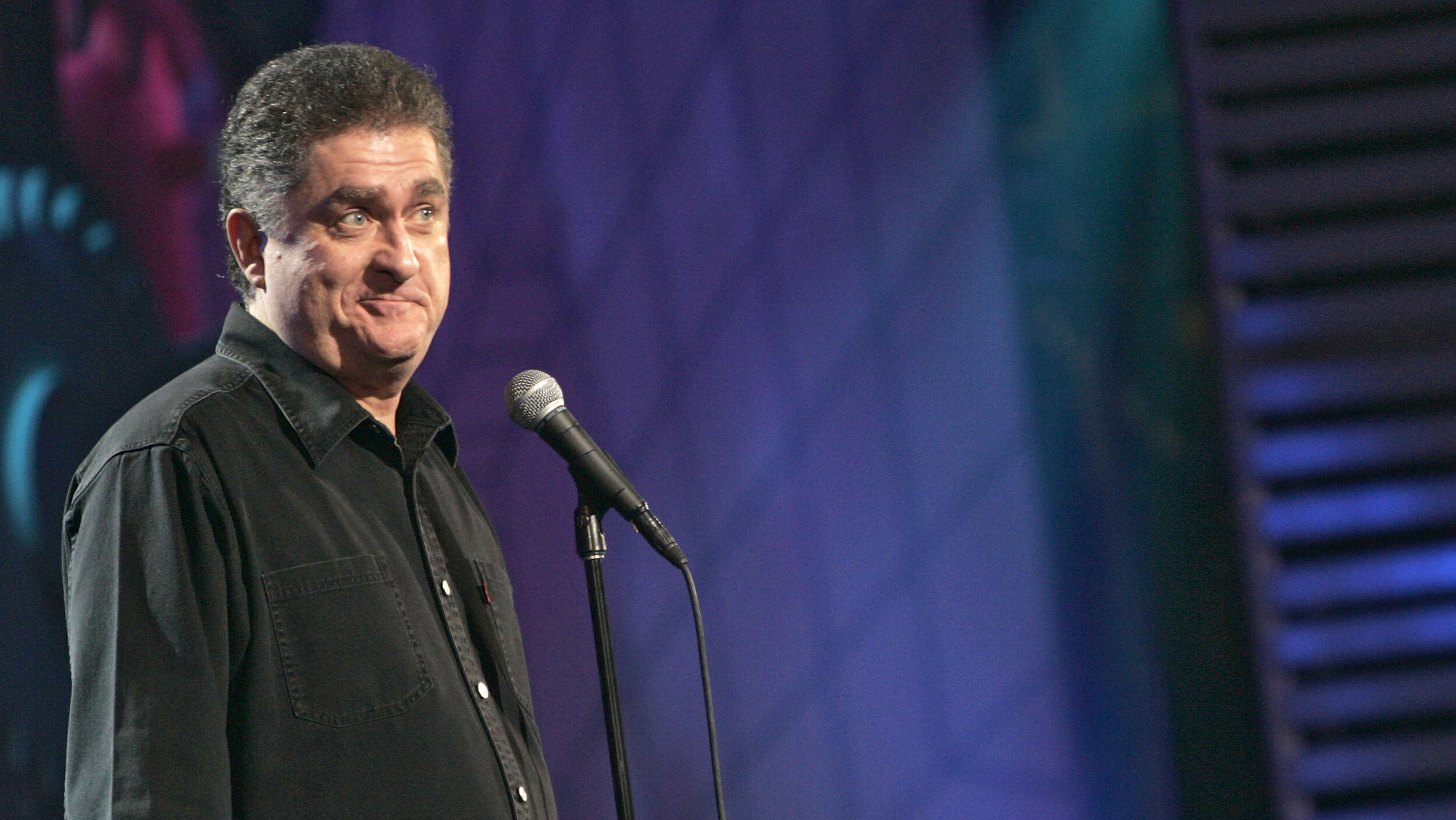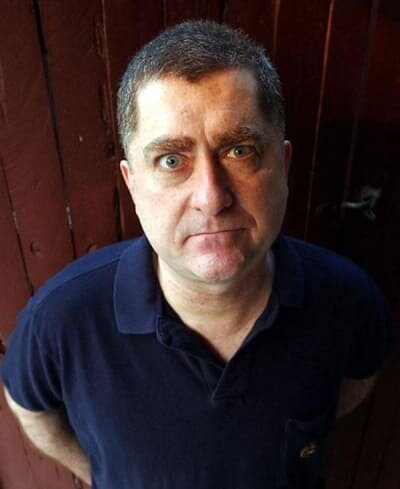Remembering Mike MacDonald... by John Wing (part 2)
By the mid-nineties, he was ensconced in Glendale and I in Tujunga. Although the two L.A. suburbs are not far apart, we would see each other at Comedy festivals or occasionally at airports, only rarely in town. He would surprise me, once walking up while I was eating in a Burger King at LAX, and throwing his big shadow on my table until I looked up. “You don’t pay attention much, do you?” he said. “I could have killed you twice today already.” I would always say “Hi, Mike,” in a little-boy voice, like the dog in the cartoon who idolizes the big bulldog. “Mikey’s my hero, cause he’s so brave and strong.” And after I said hi, he would launch into whatever he was writing about, no intro. He always had a new idea or a bit he wanted to try out. He never asked how I was, what I was doing, et cetera. I was free to tell him, if he needed a break from his story, but he never asked, which, by the way, was fine once you got used to it. Once he started talking, I was going to laugh, so what the hell.
Once in Montreal, we each had a free afternoon and he invited me to his hotel room to play a hockey video game he had at the time. I wasn’t very good with the joystick he gave me and it took me some time to get better at it, while he was yelling at me, telling me what to do. It reminded of me my father teaching me to drive. I improved a bit, but he soon tired of me being no competition and we went out to eat. We never played video games again.
A word about eating with Mike. He was probably OCD which wasn’t readily diagnosed twenty or thirty years ago, so there were moments when you could only stare and wonder. One night in Montreal, a bunch of comedians went out to eat after a Festival gala show. There were eight of us. At 1:00 a.m. we ordered food. Mike had pancakes, ordering at least four extra syrups. When they came, he very carefully cut the stack into a thousand small pieces, and then slathered the whole thing with enough syrup to make it resemble soup. Then he ate it. I looked around to see if any of the other comics noticed how disgusting it was, but none did. Maybe they’d all eaten with him before. Afterward, I never put syrup on pancakes again. I rarely even have them now, because the sight of them always reminds me of watching him eat that diabetic coma-inducing late-night snack.
Another symptom of his OCD was when Mike was into something, he was really into it. Get him talking about the Beatles and you might not get home for a week. He had an intensity that must have been so tiring. But he always saw the funny. He was bipolar and got depressed frequently. At one point, he even checked himself into a mental hospital because he was seriously considering committing suicide. He told me that California’s gun laws saved his life. He went to a firearms store to buy a gun, intending to shoot himself with it. But he had to fill out a bunch of forms and then wait three days to get the gun. Within that time period, his wife and his manager convinced him to check himself in voluntarily for thirty days. He told me he loved the mental ward. His first day, he was sitting in the common room, zoned on Lithium, and an older woman patient approached him and said, “I know why you’re here. They sent you here to watch me, didn’t they?” Mike looked at her, motioned her to come closer, and when she did, he whispered, “No, they sent me here to watch her,” pointing to another woman across the room. He became great friends with the woman, and enjoyed the low intensity, no-stress mental ward so much that after thirty days he deliberately reported that he was still suicidal in order to stay another month. Or that was the story he told me.
Once at the Halifax Comedy Festival, I walked into the giant green room backstage at the opening night gala. Milling at the door, I spotted Mike way across the crowded room, sitting by himself with his little bag, which contained his medications and what he called his “Show Uggs”. He wore Ugg boots all the time by then, and he had a special pair just for performance. This is a common quirk of comedians. We have pieces of clothing that are designated as “Show” meaning they are always worn in performance, since they make us feel good, or lucky, or whatever. It’s silly, but we all do it. He spotted me and waved me over, a bit urgently. I apologized to the person I was talking to, “Mr. MacDonald requires my presence,” and walked over to him. When I got there I bent down to say “Hi Mike” and he whispered, “Watch my bag while I go to the can,” and he was GONE. Whoosh. And I understood that I was being paid a large compliment. Mike was clearly saying you’re the only person in this room that I trust. An odd acknowledgement of friendship, yes, but I was flattered.
Mike’s comedy changed as he got older. The physical part waned since he couldn’t do as many moves. But, it also got sharper, in its phrasing, its concepts, and ideas about the world. Mike was a philosopher in many ways. He looked at things from a perspective even comedians didn’t notice, and he could describe it in vivid terms and brilliant colours. One of the last times I saw him perform, he did a bit about watching children in the schoolyard, and how you can tell what they’re going to be in life. I can’t reproduce it, since I only saw it once, but it was lovely and funny and he had found a sweetness onstage to replace the anger that had fuelled his earlier years. As comedians age, one of the worries that dogs us is How will I stay relevant? Each year one must stuff as much about current culture as one can into an already crowded head. It’s easy to get lazy and not do it. You don’t want to do it at sixty, but your survival as a performer, as an artist, depends upon it. Mike never lost interest in the world in which he lived or the people inhabiting it. He just preferred to watch them rather than meet them personally. But what was going on in music, in electronics, in movies, in the digital world he always knew, and he could talk about it, explain it, and make it funny. His brain was enormous, as was his appetite for knowledge. Everything was fodder for his wood-chipper mind.
Then he got sick. A lot of rumours flew around about it, but the gist was he got or had had Hepatitis C for many years, which was not a huge surprise. Our drug use as young men always comes back in some illness-package. Mild if we’re lucky, but just as likely not. He and his wife had moved back to Ottawa for the healthcare he was going to need. I saw him in the summer of 2012 at the Montreal Comedy Festival. I happened to be in the lobby of the hotel when he checked in. He was thin and drawn, and when he saw me, he said “Hi John, how are you?” We had known each other 32 years, and that was the first time he asked how I was, and it might have been the first time I heard him say my name.
Backstage at my gala that night, he talked with my wife and me for a while. The previous night had been the opening ceremony of the London Olympics, and he’d watched the whole thing. “Only the Brits,” he said, “would have the balls to do comedy at that sort of event.” He deconstructed the comedy brilliantly, as one might expect. He told me privately that he needed a liver transplant, and very soon. He was on a list, he said. I prayed he would get one.
I saw him again a few months later, at a comedy festival in Ottawa. He looked like a prisoner of war who’d been starved for a few years. He looked like he could die at any moment. He could barely stand up. We were backstage, and he was going to receive some sort of an award. (He’d gotten the Lifetime Achievement Award from the Canadian Comedy Awards that year because they were afraid he would die. Not that he didn’t deserve it. He did.) When he was called onstage, he shot out of his chair and strode to the microphone, not healthy, but, as always, adrenalized by the applause and the chance to speak. I watched in awe. Afterward, he confided to me that he probably had no more than a few weeks to live.
But he lived. The transplant call came and he went to Toronto and got a new liver, which his body accepted and he came ALL the way back. He claimed after recovering that he couldn’t remember any of his act, but that was probably okay, since he would have come up with a good solid thirty on the transplant alone. I think his act came back eventually. It never really goes away. Sometimes it just waits for you to find it again.
Photo by Paul Couvrette
About a year afterward, I was playing Ottawa and I walked into the club for the first show on Thursday night, and there he was, looking hale and hearty. He even asked how I was again. I can’t adequately describe how pleased I was to see him. He sat at the bar in the back of the room for my whole set, and I played the majority of it right at him, hoping for the “WAAAK!. Afterward he gave me notes. And they were great. His perspective was as razor-keen as always. We went out and ate and he took me for a ride in his car so he could play me some of the Beatle covers he’d collected on his iPod. Beatle covers from around the world were one of his great obsessions. We had such a lovely time.
A year or so later, I got into a little controversy on Facebook, as you do, and Mike put in an opinion, so I called him on the phone, something I’d rarely done ever. We talked for about an hour, veering off from the controversy into our lives and doing bits for each other. I was sorry when I had to hang up and go back to my life. A week later, Mike went into the hospital for a heart episode and never came out. I hope it was quick. He was 62. I had a date in Ottawa booked for two months later, and had been looking forward to seeing him. Aw hell. That he lived sixty-two years is in itself something of a miracle. He lived hard. He was addicted to heroin and got off it. He smoked pot and hash for years, then cigarettes, all of which he eventually quit. He fought mental illness. He found God. He drove his formidable intellect right to its edge a hundred thousand times, and that would be a low estimate. He was my friend, and he had a large and kind heart. And oh my God was he funny. A comedy fuse, an asteroid. I can’t wait to meet up with him in heaven. “Hi Mike.” And he’ll start right in, “You know the weird thing about heaven is…no one tells you anything…”
Cover photo by Couvrette Photography





